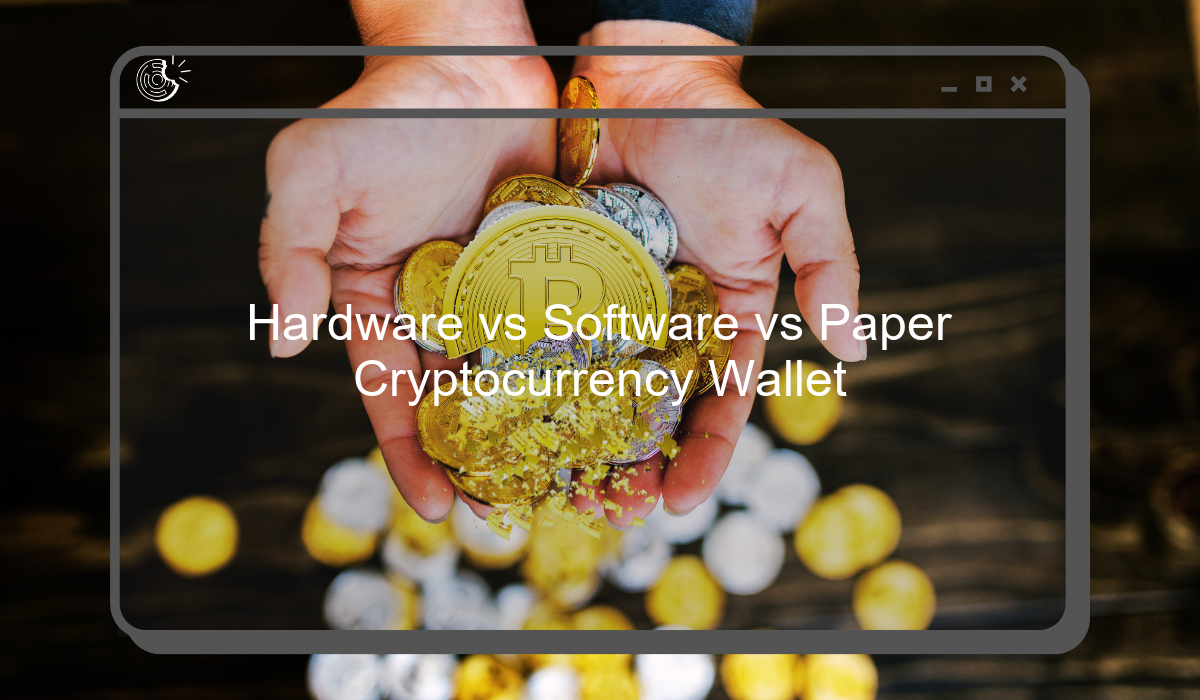Hardware vs Software vs Paper Cryptocurrency Wallet

As with any kind of currency, you need to have somewhere to keep it, and keeping your digital coins in an online exchange account is just not safe enough or secure enough
While online trading accounts are great for keeping small amounts of cryptocurrency for the purpose of executing trades, you need to keep the majority of your investment in a specially designed, secure, and fit for purpose way.
By using a wallet, you can store your coins for easy retrieval as and when you need them.
There are several different kinds available, and we will explain the difference between a hardware vs software vs paper cryptocurrency wallet.
In this article we will give you the inside info on the fundamental differences between each type, as well as giving you some suggestions for leading brands to check out:
What Is a Hardware Wallet?
When it comes to the most secure way to store your cryptocurrencies, then hardware wallets undoubtedly have the edge.
A hardware wallet is a physical wallet, similar to a USB drive, where you can store the private keys for your currency, without any risk of hacking or viruses.
Because the hardware wallet is never connected to the internet directly, it is impenetrable to viruses, malware, or individuals that may seek to infiltrate and steal your coins.
Another way in which it’s secure is that buttons control the device on its screen rather than via the computer.
This means that even if your computer is compromised by key-stroke logging software or any other kind of virus, then information such as your passkey remains completely safe.
A good hardware wallet should contain physical buttons, an LED screen, and be able to back up and offer recovery of the private keys that are stored on it.
The Best Hardware Cryptocurrency Wallet
A great example of a top-quality hardware wallet is the Ledger S Nano.
It comes in a completely sealed box complete with a holographic sticker that lets you know if anyone has tampered with it.
The box contains the device, a USB lead, a keychain and lanyard, an instruction card, and a recovery card.
The device itself is slightly reminiscent of Apple products, and they are nicely designed and presented.
The Ledger is also very straightforward to set up, and all you need to do is plug it into your computer via the included USB drive.
Then you need to select a pin via the buttons on the front of the device, and write down the 24 recovery words that the device gives to you- these are super important should you lose access to the device and you would need to recover it and your coins.
There are a few hardware wallets on the market, but the Ledger S Nano is by far our favourite.
The reason for this is that they all have similar functions and features, but the Ledger is by far the cheapest.
This is one occasion where we would say it is OK to go for the cheaper option as there is no quality lost by using this product over a more expensive one.
Read more in our Ledger Nano S Review or visit The Best Cryptocurrency Hardware Wallets.
What Is a Light/Online Wallet?
There are two types of light/online wallets, and these can be divided into two categories- desktop and mobile.
Desktop Wallet
When it comes to application based wallets, a desktop wallet is much more secure than a mobile wallet for the simple reason that they are a lot harder to steal.
A desktop wallet is a piece of software that is downloaded onto the physical drive of your computer. You then open it when the computer is connected to the internet and you send your currency to and from it as you please.
The issue with a desktop wallet is that it is always at risk of hackers and malware that could be installed on your computer without you even knowing it.
If your computer is compromised, it means that hackers and unauthorised individuals can gain access to your computer, without your permission and then steal data such as passwords and cryptocurrency pass keys without you even realising.
Desktop wallets are great, but we recommend only keeping small amounts of currency in them and just keeping money in it when you are intending on using it.
The Best Desktop Wallet
A very hotly tipped desktop wallet is Electrum.
While it may not be the prettiest programme in the world when it comes to storing Bitcoin, it is one of the best.
The simple interface means it is also great for beginners as you don’t have to spend time getting to grips with the complicated interface.
Electrum is a robust, effective and secure solution and it is also open source meaning the code has been well reviewed and improved meaning the chance of it containing malware is around zero.
Also keep your eyes open for is Bitcoin Core.
This is a node wallet for advanced Bitcoin investors and traders because it downloads the whole blockchain to your computer.
This means that you need at least 130GB of space on your computer, and of course, it will take a little while to download.
Once it is downloaded, you can verify transactions independently, and you do not need to place your trust in anyone else in the system.
For the casual cryptocurrency trader, it is not worth it, and this is an application only for the geeky amongst us, as well as those that are looking for a bit of educational information.
Mobile Wallet
A mobile wallet is also a downloadable application that you keep on your mobile device.
Protected by the passcode of your mobile phone as well as an additional passcode to access the application, it is a very secure way of storing your cryptocurrencies – as long as you don’t lose your phone or get it stolen.
It works in the same way as a desktop wallet, but it is more geared towards people that are on the go or that are making a lot of transactions using cryptocurrency and need easy access to their funds wherever they are and whatever they are doing.
The best way to use a mobile wallet is to transfer into it just the funds that you intend to use, and nothing more.
This way you can protect the bulk of your investment, in the case that you lose or get your phone stolen.
The Best Mobile Wallet
A great mobile wallet with a solid reputation is MyCelium.
While it is a little bit complicated for beginners, it offers some of the most advanced privacy and security features out there.
It is also continually being upgraded and updated so you can rest assured that it is as secure as possible.
It is fast and efficient and only works on mobile (Android) meaning that you cannot access your coins via desktop. You can also use it in conjunction with a hardware wallet for maximum security for your cryptocurrencies.
Other applications based cryptocurrency wallets that are worth considering include BreadWallet, Copay Android Bitcoin Wallet, and Jaxx.
What Is a Paper Wallet?
Well, as the name would suggest, a paper wallet is a cryptocurrency wallet that is tangible and often made out of, yes you guessed it, paper.
The private keys are printed, or stored in QR code format and then printed out onto paper.
This can then be stored securely in a fireproof and waterproof pod, or if you want to risk it, be folded up and kept in your wallet.
The generation of paper wallets is not really recommended from a PC that is connected to the internet.
This is because the PC could be infected with malware which would be able to steal the information relating to your paper wallet. Even if you can generate the keys in a private and secure way, they are still open to being stolen or lost.
It is worth noting that unencrypted paper wallets must then be stored in the same way that you would store jewellery or cash in a safe or safety deposit box.
You can, however, improve the security of paper wallets by splitting the contents into shares, for example requiring X and Y shares to reassemble the secret keys.
Some tips for effectively using paper wallets include disconnecting the computer with your paper wallet generator from the internet, ensuring that the author of the code is reliable and that a hacker hasn’t modified it.
You should also be aware and alert for spyware and viruses that attempt to monitor your computer activities, and you must ensure that you never save the wallet to your computer hard drive or send it via email.
Another tip, when it coms to paper wallets, is to ensure that the printer you are using does not have an internal storage that saves copies of everything it prints. If your printer does this, the security of your keys is at risk and it is also at risk of being hacked.
The Best Paper Wallet
If you are looking for a functional paper wallet, the IOTA paper wallet is a right place to start.
Ideally, you need to create the seeds and generate the addresses offline on a computer that has a fresh operating system install and is not connected to the computer.
Once you have generated the seeds, you need to put them into the paper wallet generator to create the addresses you need.
Make a record of the seeds and addresses in the KeePass and save to a USB drive as means of a backup.
What Is The Best Option For Me?
When it comes to ultimate security, the best option for you is a hardware wallet.
Because of its design with all controls done directly from the buttons on the device itself, and the fact it is never connected directly to the internet, this means that it is by far the most secure.
Another benefit is the fact that you can back it up, so even if you misplace it, you can be sure that you can retrieve all of your keys without any problems.
When it comes to the best brand of hardware wallet to buy, it has to be the Ledger Nano S.
By far the best value hardware wallet on the market, it does everything you need it to, looks good while it does it, and is significantly cheaper than many other alternatives.
Why splash out unnecessary cash on a device that does the same thing as one that is significantly cheaper?
The number one thing to remember is that you should not, under any circumstances keep large or substantial amounts of cryptocurrency online or in a wallet that is connected to the internet!
Store it offline and securely with a hardware wallet, and you ensure that you and your investment is as secure as it can be.
When it comes to the difference between a hardware vs software vs paper cryptocurrency wallet, security is the most crucial aspect.
Read more about The Best Cryptocurrency Wallets.
Cryptocurrency Analyst

